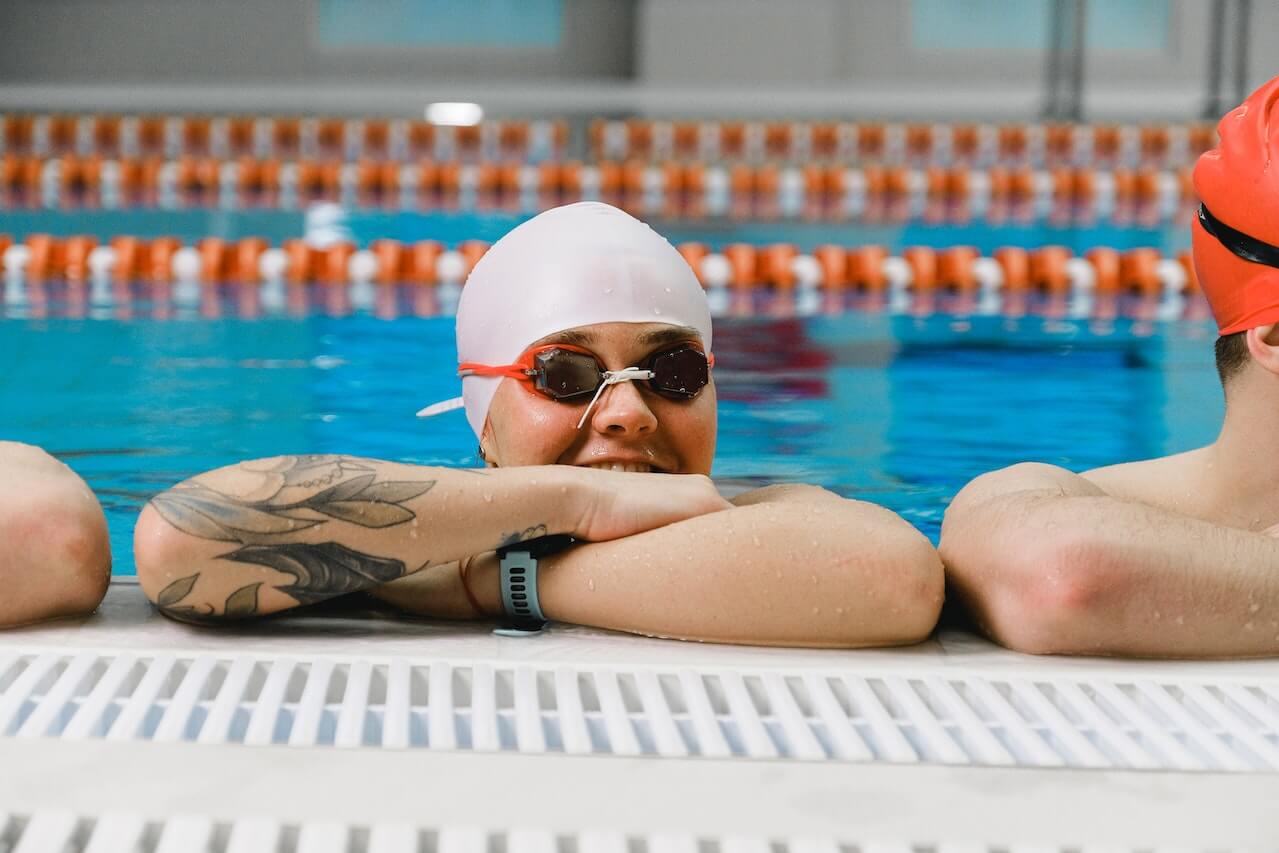So you’ve just gotten some fresh ink, and now you’re itching to dive into the water for a refreshing swim. But before you do, you ask this critical question: how soon can you swim after getting a tattoo?

You cannot swim right after getting a tattoo because swimming too soon could jeopardize the healing process. During the first few weeks, your tattoo goes through several stages of healing, and exposing it to water can lead to unwanted complications. To ensure your tattoo heals properly and looks its best, wait at least 2-4 weeks at a minimum.
In this article, we’ll discuss the healing process of your tattoo and explain why it’s essential to wait before jumping into the pool.
The Healing Process of a New Tattoo
Healing Time
Allowing the tattooed area to heal without complications ensures that it lasts a long time and looks just the way you expect.
Typically, a tattoo takes about 2 to 4 weeks to heal, but can take longer depending on factors such as the size, location, and your aftercare practices. For larger tattoos, wait 4-6 weeks, or even longer if necessary.
In some cases, healing might even take up to six weeks or more. Patience is vital during this time, as you want to avoid interrupting the healing process, which could cause health complications.
Stages of Healing From a Fresh Tattoo
Knowing the stages of healing can help you understand what to expect during your tattoo’s recovery period. The healing process generally occurs in four main stages:
- Initial Healing: Right after getting your tattoo, the area may be red, swollen, and a bit sore, which is a normal reaction. Your tattoo artist will usually cover the tattoo with a bandage or a special waterproof dressing to protect it. Keep the bandage on for the recommended time, usually 24-48 hours.
- Scabbing and Flaking: A few days after getting your tattoo, you’ll notice scabbing and flaking start to occur. This is a sign that your skin is healing beneath, and you should not pick or scratch at scabs, as this could damage the design or introduce bacteria.
- Itching and Peeling: As your scabs begin to fall off naturally, you may experience some itchiness and peeling in the area. Again, resist the urge to scratch, as this could disrupt the healing process. Instead, alleviate the itch by gently tapping or applying a fragrance-free, alcohol-free moisturizer.
- Skin Irritation and Settling: The final stage of healing occurs when the skin irritation subsides, and your tattoo starts to settle into its permanent appearance. As the skin continues to regenerate, any remaining flakiness will disappear, giving way to vibrant, smooth ink.
You should follow the aftercare routine that your tattoo artist recommends for a smooth healing process and to ensure your tattoo looks just the way you like it for years to come.
Risks of Swimming with a New Tattoo

Infections
One of the primary concerns when swimming with a new tattoo is the increased risk of infection. Your fresh tattoo is essentially an open wound, making it vulnerable to harmful bacteria found in water.
Swimming in a contaminated pool or a natural body of water, like an ocean or a lake, can introduce various types of bacteria, including vibrio vulnificus, which can cause severe infections.
Signs of infection may include:
- Excessive redness or swelling
- Yellow or green pus
- Foul odor
- Persistent pain
- Fever or chills
If you notice any of these symptoms after swimming with a new tattoo, go see a doctor right away.
Chemical Effects
Swimming pools contain various chemicals, such as chlorine, that can negatively affect your healing tattoo.
For instance, exposure to these chemicals may cause discoloration or fading in your tattoo’s ink. The chemicals may also cause skin irritation – itchiness, redness, dryness, etc., which can hinder the healing process.
Physical Damage
Physical damage to a new tattoo can occur when swimming, too. For instance, your tattoo may be exposed to friction from pool walls or swimsuits, which can disturb the formation of scabs, leading to scarring and unevenly healed ink.
In addition, waterlogged skin is more susceptible to damage, so extended time in the water can cause unintentional harm to your new artwork.
When Can You Expose Your Tattoo to Water?
The Shower
After getting a new tattoo, you might wonder when it’s safe to take a shower. While it’s important to keep your tattoo clean, you should avoid soaking the area in water for an extended period of time.
Typically, it’s safe to take a gentle shower 24 hours after getting inked. However, avoid using strong soaps or scrubbing the area, as this may irritate your new tattoo.
The Beach and Pool
As tempting as it may be to hit the beach or pool with your fresh ink, you should wait until your tattoo is fully healed before swimming in any water source.
This usually takes 2 to 4 weeks for smaller tattoos. Beaches and pools can harbor harmful bacteria, and the chlorine in pools can cause irritation to your new tattoo.
Additionally, exposure to the sun can damage the color and overall appearance of your tattoo. Be patient and give your ink time to heal before venturing out for a swim.
Lakes, Rivers, Oceans, Etc.
Similar to pools and beaches, avoid swimming in other water sources, such as lakes, rivers, and oceans, until your tattoo is healed.
These natural water sources can also introduce bacteria and irritants that may lead to infection or damage to your new artwork.
Hot tubs should also be avoided, as the combination of hot water and chemicals can be hazardous for your fresh ink.
After 4 weeks, assess how far along you are in the healing process. If all is well, then you can safely enjoy your favorite water activities again, otherwise wait an additional 1-2 weeks.
Remember, proper care is essential for the longevity and appearance of your new tattoo. Keep it clean, protected, and away from water sources to enjoy your new design for years to come.
Proper Tattoo Aftercare
Your tattoo artist will give you instructions on how to care for a tattoo. If for some reason they don’t (or do a poor job), then below are some guidelines to follow.
What to Avoid
After getting a new tattoo, keep it away from potentially harmful elements, such as:
- Swimming pools: Avoid swimming until your tattoo is fully healed, which can take 2 to 4 weeks. Chlorine and bacteria in the water can cause infection or irritation. You can shower after 24 hours.
- Sunlight: Keep your tattoo out of direct sunlight, as it can fade the ink and hinder the healing process.
- Tight clothing: Avoid wearing tight clothing that could rub against the tattoo and cause irritation or damage.
- Picking at the scabs or skin: This can lead to infections or affect the appearance of your tattoo.
Helpful Products
There are various products available to help with tattoo aftercare. Some of these include:
- Saniderm: A transparent adhesive bandage that protects your tattoo during the initial healing stage while allowing the skin to breathe.
- Fragrance-free soap: Use a gentle soap without fragrances to cleanse your tattoo without causing irritation.
- Fragrance-free lotion: A lotion without harsh chemicals or fragrances will help keep your tattoo moisturized and promote healing.
Returning to Swimming Activities
Precautions to Take
So, you just got a new tattoo and are eager to jump back into the water. Hold on a moment! You should wait at least 2 to 4 weeks for your tattoo to heal before swimming in any kind of water.
This is important, as submerging a fresh tattoo in moisture can potentially expose it to irritants and microorganisms that can cause infection or irritation.
Keep your tattoo clean and dry as much as possible during the healing process. Follow the aftercare instructions provided by your tattoo artist, which usually include the use of a waterproof dressing or waterproof bandage.
This covering helps to protect your new ink from sweat, bacteria, and other contaminants.
Monitoring for Health Issues
Pay close attention to any changes in your tattoo during the healing process. Look out for signs of irritant contact dermatitis, such as red itchy bumps or other signs of irritation.
If you notice any adverse reactions, consult your healthcare professional immediately to address potential risks and receive appropriate guidance.
Understandably, the idea of waiting for a few weeks before diving back into your beloved swimming activities can be frustrating, especially during the summer months.
However, keeping your tattoo clean and dry is crucial to ensure it heals properly and maintains its vibrant appearance.
Frequently Asked Questions
How can I protect my tattoo if I have to swim?
If you absolutely have to swim, try to keep your new tattoo out of the water as much as possible. Cover it with a waterproof dressing to minimize contact with water. However, bear in mind that there is always a risk of infection and irritation when swimming with a fresh tattoo, and the safest option is to wait until it’s fully healed, typically 2-4 weeks.
Can you swim in chlorine after getting a tattoo?
No, you should avoid swimming in chlorinated water after getting a tattoo. Chlorine and other chemicals in pool water can irritate your fresh tattoo, causing discomfort and potentially disrupting the healing process. Additionally, these chemicals may cause your tattoo’s ink to fade or discolor.
Can you swim in the ocean after getting a tattoo?
Swimming in the ocean with a new tattoo is not recommended. Ocean water can contain bacteria that might cause an infection in your new tattoo. Moreover, salt water can dry out your skin, leading to irritation and potential harm to your tattoo.
What should I do if I already went swimming with a new tattoo?
If you’ve already swum with a new tattoo, it’s essential to monitor the tattooed area for any signs of infection, such as redness, swelling, or discomfort. Clean the area gently with a mild, fragrance-free soap and pat it dry. If any signs of infection are noticed, consult a healthcare professional immediately. In the future, avoid swimming until the tattoo is fully healed.
Sources:
- https://www.healthline.com/health/body-modification/how-long-after-a-tattoo-can-you-swim
- https://www.healthline.com/health/vibrio-vulnificus
- https://tattify.com/how-long-after-a-tattoo-can-you-swim/
- https://www.savedtattoo.com/can-you-swim-after-getting-a-tattoo/
- https://certifiedtattoo.com/blog/how-soon-can-i-let-my-tattoo-get-wet
